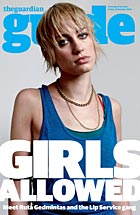I was writing the novel in the small hours of last Friday night and it seemed apt to drop into the dialogue the German title of one of the two songs the Beatles sang in translation for the German market in their early years. Virtually everyone in Western civilsation and beyond knows about the Beatles’ apprenticeship in Hamburg.
In fact at the end of last year I went to see — and thoroughly enjoyed — the musical Backbeat at the Duke of York’s Theatre on St. Martin’s Lane which is based on the young Beatles experience in Germany. By remarkable co-incidence, Ruta Gedmintas stars in Backbeat — playing the artist Astrid Kirchherr who is credited with being a huge influence on the embryonic Beatles. (It closes at the end of February so I’d recommend anyone to go and see it. I got seats in the second row, which was rather marvellous.)
But it’s probably only Beatles fans that know that the band sang German translations of She Loves You and I Want to Hold Your Hand — and apparently these recordings are particularly rare as they were made in Paris — the only session the Beatles ever recorded outside the UK.
Co-incidentally, after I’d written the a reference to Komm Gib Mir Deine Hand, the other translation Sie Liebt Dich turned up on my phone on shuffle when I was going for a run yesterday. Listening to familiar songs sung in a different language must be a little like the experience of non-native English speakers listening to popular music, which is predominantly sung in English more or less everywhere.
The lyrics to She Loves You/Sie Liebt Dich are actually so simple (although effective) that I could understand virtually all of the German translation, even with my limited grasp of the language. (Having spent much of the last 10 years making business trips to Germany, I’m much better at understanding German — from overhearing conversations, watching TV, reading newspapers/billboards — than speaking it myself.) I guess that a familiarity with hearing simple English almost ubiquitously in popular culture must give non-native English speakers much more confidence when learning the language.
I’ve found a couple of German-originated clips of the songs on You Tube.
Sie Liebt Dich should appear below (except if, like me you’re using Chrome when, for some odd reason it fails to show):
I haven’t done a detailed comparative analysis but my initial impression is that Paul McCartney’s vocal is far more prominent on the German version than the English recording of She Loves You. I can well imagine McCartney being much more willing to put himself out to do whatever he could commercially when the Beatles were breaking through whereas Lennon would probably have treated it like an embarrassing joke.
She Loves You is one of the first songs I ever remember. It was released before I was born but I remember playing my parent’s copy as a young child on an old record player — and probably wrecking it too. It’s a paradoxical song. I’d never list it as anywhere close to being one of my favourite Beatles tracks but I always enjoy listening to it a lot more than I thought I would.
The ‘yeah, yeah, yeah’ refrain might be putting me off — what was seen as rebellious and daring nearly 50 years ago seem fairly puerile now. But the rest of the song is so densely packed with hooks (harmonies, furious drum fills, the fascinating atonal chord at the end) and played with such energy that it stands as a condensed version of what makes a great pop song — or any commercial work of art. It’s instructive to me with my writing — surely I can write a chapter with characters having dinner in less than 8,000 words if so much can be packed into two and half minutes of music and be all the greater for it?
An argument can be made that the popularity of the Beatles marked the emergence (at least into the mainstream) of art-driven, hedonistic youth culture. See this quotation from the brilliant Ian MacDonald from ‘Revolution in the Head”If it has any message at all, that of  I Want to Hold Your Hand, is of “Let go — feel how good it is”. This implied…a fundamental break with the Christian bourgeois status quo. Harbouring no conscious subversive attempt, the Beatles, with this record, perpetrated a culturally revolutionary act.’
Ironically, after the feedback session I had with the MMU MA class this evening, I’ll probably end up cutting the section with Komm Gib Me Deine Hand mentioned but I’m sure I can work in the reference somewhere else.

